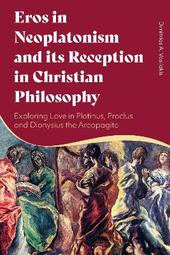
|
Eros in Neoplatonism and its Reception in Christian Philosophy: Exploring Love in Plotinus, Proclus and Dionysius the Areopagite
Hardback
Main Details
| Title |
Eros in Neoplatonism and its Reception in Christian Philosophy: Exploring Love in Plotinus, Proclus and Dionysius the Areopagite
|
| Authors and Contributors |
By (author) Dimitrios A. Vasilakis
|
| Physical Properties |
| Format:Hardback | | Pages:232 | | Dimensions(mm): Height 234,Width 156 |
|
| Category/Genre | Western philosophy - Ancient to c 500
Ethics and moral philosophy |
|---|
| ISBN/Barcode |
9781350163850
|
| Classifications | Dewey:186.4 |
|---|
| Audience | | Tertiary Education (US: College) | |
|---|
|
Publishing Details |
| Publisher |
Bloomsbury Publishing PLC
|
| Imprint |
Bloomsbury Academic
|
| Publication Date |
24 December 2020 |
| Publication Country |
United Kingdom
|
Description
Showing the ontological importance of eros within the philosophical systems inspired by Plato, Dimitrios A. Vasilakis examines the notion of eros in key texts of the Neoplatonic philosophers, Plotinus, Proclus, and the Church Father, Dionysius the Areopagite. Outlining the divergences and convergences between the three brings forward the core idea of love as deficiency in Plotinus and charts how this is transformed into plenitude in Proclus and Dionysius. Does Proclus diverge from Plotinus in his hierarchical scheme of eros? Is the Dionysian hierarchy to be identified with Proclus' classification of love? By analysing The Enneads, III.5, the Commentary on the First Alcibiades and the Divine Names side by side, Vasilakis uses a wealth of modern scholarship, including contemporary Greek literature to explore these questions, tracing a clear historical line between the three seminal late antique thinkers.
Author Biography
Dimitrios A. Vasilakis received his PhD from King's College London, UK and completed a post-doc in Ludwig Maximilian University of Munich, Germany.
ReviewsThis is an imaginative book ... His argument is successful because he pays attention to textual nuances. * The International Journal of the Platonic Tradition *
|